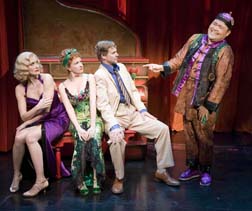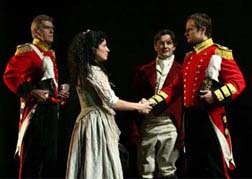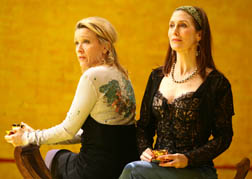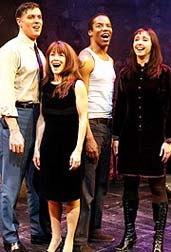Theater
Durang spoofs stock Chinese character, bar singers and man on the run.

Christopher Durang‘s clever, witty and marvelously staged musical parody of film noir, set in Macao, circa 1952, gathers the requisite long lanky blonde in slinky purple gown, the slightly seedy but good-looking bar owner, the deposed former club singer, who fights gamely for her job, a “scrutable” Chinese factotum called Tempura because he‘s been battered by life and – well, you get the idea.
Uncategorized
Inter Press Service (IPS), Feb 23, 2007
How big pharma and technology companies move patents offshore to cheat on $ billions of home taxes

Last week, Merck, the pharmaceutical multinational, announced that it will pay 2.3 billion dollars in back taxes, interest and penalties in one of the largest settlements for tax evasion the U.S. Internal Revenue Service (IRS) has ever imposed. Merck had cooked its tax books by moving ownership of its drug patents to its own Bermuda shell company — an entity that has no real employees and does no real work — and then deducting from U.S. taxes the huge royalties it paid itself.
What Merck did isn’t unusual but in fact is becoming common for multinationals in the era of globalisation. It’s one of the ploys in a corporate bag of tricks called profit laundering. In an era where much of a company’s assets may be intangible intellectual property — patents, logos, manufacturing processes — this strategy can make reported profits and taxes disappear.
Theater
Brian Friel‘s play examines how Brits used English language to dominate the Irish. The Manhattan Theatre Club’s revival of Brian Friel’s 1980 play ”Translations” is a stunning and moody production that examines the use of language to bond and to divide in both a personal and a political sense. It also becomes a symbol of patriotism and conscience as it plays into the conflicts and connections among the occupied and the occupiers in Ireland in 1833.

Setting his tale in the imaginary Irish village of Ballybeg, (itself renamed from the Gaelic, Baile Beag) in a hardscrabble dirt-floored school house in a mud-walled old barn, Friel presents a ”conquered” people who may be dirt poor and no match for British military power, but who are literate and thoughtful.
Theater
Beth Leavel in the title role offers the only bright witty moments By Lucy Komisar “The characters are two dimensional and the plot is well worn,” says “the man in the chair” (Bob Martin). He‘s got it right. The nervous laughter from the audience is the kind that is elicited by TV sitcoms aimed at […]
Theater

The subject could be sitcom. It involves a family of women. The mother Pilar (Zoe Caldwell) is a widow who has just found a younger lover. Her daughters, both actresses, Aurelia (Linda Emond) and Nuria (Katherine Borowitz), are excruciatingly jealous of each other.
As this is by French playwright Yazmina Reza, it‘s not sitcom, but cultural commentary. But the attempts at commentary are slight. If her apercus had sharp edges in France, they were worn down crossing the Atlantic.
Scoops, Tax Evasion
Feb 2, 2007
There is movement on the Hill to go after tax shelters and enforcement against tax cheats. 
With acute budget pressures, the time is ripe.
The Democrats are in a box. They have promised to eliminate the deficit, not raise taxes, to expand health care and more for Americans. Nobody is going to press for tax increases. The only place to find cash is the tax gap, to figure out how to go after the corporations and people who cheat. Members of Congress are actively talking about the problem.
Legislation is coming out of the Senate. Senator Carl Levin is pushing the idea of criminalizing the proceeds of tax evasion, which would be remarkable. The House Banking Committee will have bills. There is likely to be something out of Finance and Ways and Means.
Theater
It‘s a telenovela! declares Mathilde (Vanessa Aspillaga), the  Brazilian maid, in Sarah Ruhl‘s riff on the roles and status ascribed by social class. Part fantasy, part deftly devised social commentary, and part a passel of good jokes, the play unfolds in a delightful zig zag of unexpected turns.
Brazilian maid, in Sarah Ruhl‘s riff on the roles and status ascribed by social class. Part fantasy, part deftly devised social commentary, and part a passel of good jokes, the play unfolds in a delightful zig zag of unexpected turns.
The insouciant housekeeper, Mathilde, doesn‘t like to clean houses. “When I was a child,” she recalls, “I thought, if the floor is dirty, look at the ceiling.” She spends her time inventing good jokes (which we hear in Portuguese) and dreaming about her parents, who had a very good time dancing, making love and telling jokes.
Theater
Adam and Eve – men and women — through the ages turn love into self-love. 
This is a cute, quirky spoof about male-female relations, jealousy and power, and the celebrity culture of Hollywood. It starts out with Adam and Eve and progresses to love, which turns out to be lethally self-involved. The movie star piece is a good finish, since the celebrity world represents the apotheosis of self-love. The three vignettes, in which the central characters are all women – all Kristin Chenoweth — might be considered sexist, except for the fact that men don‘t come out looking so good, either.
Theater
Bill Nighy a standout in a flawed play about liberals and morality. 
David Hare has written some very good political plays, among them “Stuff Happens,” which follows the Bush Administration decision-making that led to the invasion of Iraq.
He appears to have dashed off “The Vertical Hour” as a comment on the American character, particularly the character of American liberals in the light of that war. He should have written an Op Ed.
Theater
Artists tend to have signatures styles and so do playwrights, so why not directors?  Following on the success of his production of Stephen Sondheim‘s “Sweeny Todd” last year, John Doyle has staged Sondheim‘s “Company” with the same artifice of having the players double as musicians, reverting to their flutes and cellos after delivering their lines.
Following on the success of his production of Stephen Sondheim‘s “Sweeny Todd” last year, John Doyle has staged Sondheim‘s “Company” with the same artifice of having the players double as musicians, reverting to their flutes and cellos after delivering their lines.
The device gives a surreal tinge to both plays. Surreal made sense in “Sweeny Todd,” a tale about murder. But surreal for the marriage game, where a bunch of New Yorkers are trying to get their single friend, Robert (Raúl Esparza), to wed? Well, yes, it works in “Company,” too. It‘s a way of taking vignettes that might seem sitcom and turning them into artistic riffs about life. George Furth, who did the book, somehow manages to touch all the stereotypical bases without seeming clichéd.
Theater
Brandishing sticks topped with round brushes, the chimney sweeps do a tap dance atop a London row house, and audience spirits rise as high as that roof.  When life-size toys in opera voices menace children who‘ve thrown a temper tantrum, one again sees vintage Matthew Bourne, co-director and co-choreographer of “Mary Poppins,” the new musical on Broadway. Alas, most of the production numbers don‘t reach those heights. (The co-choreographer is Stephen Mear.)
When life-size toys in opera voices menace children who‘ve thrown a temper tantrum, one again sees vintage Matthew Bourne, co-director and co-choreographer of “Mary Poppins,” the new musical on Broadway. Alas, most of the production numbers don‘t reach those heights. (The co-choreographer is Stephen Mear.)
Not to say they aren‘t engaging. A dull park turns bright green with painted flowers. Statues come to life and dance (more Bourne). And officious bank officials in black morning coats bob and weave against a backdrop of columns and domed ceiling. That is all fine for Broadway, just not what we‘ve come to expect of subtly witty Bourne. Think entertainment, not artistry.
Theater
Tennessee Williams‘ play about corrupt power gets stunning performance. 
The set is like a jungle: a New Orleans courtyard with large palms and an overhead trellis dripping with vines and blood-red flowers, and on the ground, poinsettias. In the middle of the garden is a Venus fly trap under glass. The genteel Violet Venable (Blythe Danner) used to feed it fruit flies that her son Sebastian ordered from a supplier in Florida. It is a metaphor for Violet and her son, who would consume and destroy people, and for the terrible eerily parallel vengeance their actions let loose. She shows it off casually when a visitor arrives.
Theater
Story is played out by inhabitants of a mental asylum. 
In this gem of a play, thing are not what they seem, and what appears normal shares defining characteristics with what appears odd and eccentric. It shows how dissembling can be what middle and working class appearances communicate to onlookers.
Theater
Funny one-liners adorn thin plot about mounting of subversive play. 
There‘s a new genre of plays that has appeared in the past few years. A combination of political theater and theater of the absurd, they are, for want of a better term, the Bush-Cheney plays. Among them currently are “Bush is Bad,” a musical parody, and “The Dick Cheney Holiday Spectacular,” a revue by the inimitable “Billionaires for Bush.” Add to that A.R. Gurney‘s shaggy dog comedy, “Post Mortem.”
Theater
Nathan Lane brings intensity to a Simon Gray revival. 
This dark, well-made character study of a nasty, self-hating closet-gay British professor, takes place in 1971, the year Simon Gray‘s play was first produced in London. The theme fits into one of Gray‘s traditional subjects, the crises faced by middle-aged male intellectuals.
There‘s little to like about Butley (Nathan Lane), the man. He sloughs off his work and dismisses students who arrive for tutorials. He speaks in doggerel, showing his contempt for intelligence. He reserves his energy for envying those who‘ve made something of their talents. He is a miserable alcoholic. Lane‘s intensity aptly captures a man whose energies have no productive place to go.
Theater
Feminist or camp, the musical serves up wit, imagination and panache
The fascination of “Grey Gardens” is in its depiction of what happens when rich people lose their wealth. Wealthy eccentrics are cosseted while poor relatives are held in contempt. Edith Bouvier Beale (a stunning Christine Ebersole) is flakey but monied, and elegantly garbed. We find her amusing. When Ebersole plays her daughter, Edie Beale, some thirty years later, she is an oddball who bulges unattractively out of bag-lady garments, an object of ridicule and pity.
Theater
“A Chorus Line,” conceived, choreographed and directed by Michael Bennett, became a legend after it opened on Broadway more than 30 years ago. It won a Pulitzer Prize for Drama and ran for 15 years. Perhaps time has dimmed its luster, or what was shocking or unconformist then is now just ho-hum. The dancing is still exciting, but the story (book by James Kirkwood & Nicholas Dante) often seems offensive rather than groundbreaking.
Theater
Sons harbor envy and resentment and a secret you will probably guess By Lucy Komisar “Losing Louis” was a big hit in London. Maybe it lost in the translation from “Louis” to “Louie” as it crossed The Pond. If this is British humor, it‘s of the “No Sex Please, We‘re British” variety, not of the […]
Theater
Useless self-absorbed upper class ignores slide into war By Lucy Komisar The politics is subtle, the story is arch, the acting sublime. “Heartbreak House,” given a delightful production by Robin Lefevre at the Roundabout Theater, was written by a master who knew how to put his opinions forth with artistry. Shaw dissects the bourgeoisie at […]
Theater
But email musings by 20-something on Israel-Palestine is not good drama By Lucy Komisar This solo theater piece will be judged by two standards. The first is political: are viewers convinced by its arguments against Israeli policy in the West Bank and Gaza? Are they moved and persuaded by the writings — journal and emails […]
Theater
Brilliant revival of 1920s play evokes workers‘ alienation By Lucy Komisar Director Ciar¡n O‘Reilly has finely staged – sometimes choreographed — an emotionally and aesthetically powerful production of “The Hairy Ape,” Eugene O‘Neill‘s 1922 drama about class and alienation. Especially if you‘ve never watched it performed, this is a version to see. Yank (brilliantly played […]
Theater
Mix of classical and modern creates a vibrant dance idiom By Lucy Komisar Suddenly dancers in classical pose are transformed into modern angular shapes that twist and jump to the sounds of the baroque. The music becomes electronic as classical body language turns into erratic gyrations in “Anagram,” choreographed by James Sewell to the music […]
Theater
Classic and modern plays target Bush and (other) terrorists By Lucy Komisar The Public Theater in recent months consciously chose three plays to comment on the Bush war. Not by name, of course, but hardly mistakable. So did The Classic Stage. An import brought from Ireland by the Atlantic Theater Company skewered war in general. […]
Cabaret & Jazz, Theater

Songs of love, loss and war shimmer in this witty cabaret By Lucy Komisar This charming, poignant, elegantly staged theater piece of love-and-loss songs envelopes one so completely that you feel as if you‘d wandered into a Paris cabaret instead of the slightly seedy Zipper Theater, where the lobby bar and cozy corners establish a […]
Theater
By Lucy Komisar Director John Rando, known for the brilliantly campy “Urinetown,” has another success here with a witty, lively send-up of 1980s style — a Boy George look-alike (Kevin Cahoon) with long hair and swishy demeanor – mixed with a 1950s “gotta get a husband” attitude. The long joke is about a small-time band […]






 Brazilian maid, in Sarah Ruhl‘s riff on the roles and status ascribed by social class. Part fantasy, part deftly devised social commentary, and part a passel of good jokes, the play unfolds in a delightful zig zag of unexpected turns.
Brazilian maid, in Sarah Ruhl‘s riff on the roles and status ascribed by social class. Part fantasy, part deftly devised social commentary, and part a passel of good jokes, the play unfolds in a delightful zig zag of unexpected turns. 

 Following on the success of his production of Stephen Sondheim‘s “Sweeny Todd” last year, John Doyle has staged Sondheim‘s “Company” with the same artifice of having the players double as musicians, reverting to their flutes and cellos after delivering their lines.
Following on the success of his production of Stephen Sondheim‘s “Sweeny Todd” last year, John Doyle has staged Sondheim‘s “Company” with the same artifice of having the players double as musicians, reverting to their flutes and cellos after delivering their lines. When life-size toys in opera voices menace children who‘ve thrown a temper tantrum, one again sees vintage Matthew Bourne, co-director and co-choreographer of “Mary Poppins,” the new musical on Broadway. Alas, most of the production numbers don‘t reach those heights. (The co-choreographer is Stephen Mear.)
When life-size toys in opera voices menace children who‘ve thrown a temper tantrum, one again sees vintage Matthew Bourne, co-director and co-choreographer of “Mary Poppins,” the new musical on Broadway. Alas, most of the production numbers don‘t reach those heights. (The co-choreographer is Stephen Mear.)



